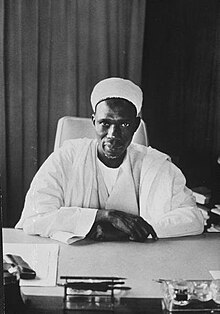Abubakar Tafawa Balewa
Abubakar Tafawa Balewa , (born October 1, 1912 in Bauchi , † January 15, 1966 ) was a Nigerian politician and writer. From 1957 to 1966 he was the first and only Prime Minister of Nigeria .
Life
After training as a secondary school teacher, Balewa began his political career as a co-founder of the Northern People's Congress , the party of the "Northern Region" of the then British colony of Nigeria. As early as 1946 Balewa was a member of the regional parliament of the northern region, in the first elections in 1951 he became a member of both the regional and the general parliament. 1952 became the labor minister, in 1954 transport minister and faction leader of his party in parliament. In 1957 he was elected Nigeria's first Prime Minister and thus head of government (the President had only ceremonial functions in the First Republic ), which he led accordingly to independence.
Political activity and assassination
Despite his willingness to reform and his modest demeanor, his reign did not have a good star, especially in the cumulative domestic political crises he often did not act independently and was increasingly viewed as an instrument of the northern elite of the country. When the internal unrest grew stronger and in 1966 the first military coup heralded the end of the First Republic, he was kidnapped and murdered by the military . His body was found on a road near Lagos six days after the abduction.
His picture can be found today on the 5 naira banknotes.
Literary work
In 1934 Balewa wrote the historical short novel Shaihu Umar , which tells the life of a pious Muslim in a fictional autobiographical form in an environment characterized by slave trade, family relationships and Islamic religion. The work was created after the head of the British colonial translation agency, Rupert East, commissioned students to write literary works in order to make the Hausa language a literary language as well. The novel was published in book form in 1955 and is still read in Nigeria today. In 1970 it was premiered as a theater play.
Individual evidence
- ^ Richard A. Joseph: Democracy and prebendal politics in Nigeria: the rise and fall of the Second Republic . Spectrum Books, 1991, ISBN 978-2461-17-2 .
| personal data | |
|---|---|
| SURNAME | Balewa, Abubakar Tafawa |
| BRIEF DESCRIPTION | Nigerian politician and writer |
| DATE OF BIRTH | October 1, 1912 |
| PLACE OF BIRTH | Bauchi (city) |
| DATE OF DEATH | January 15, 1966 |
| Place of death | at Lagos |
